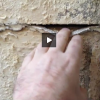I have inspected over 10,000 basements and have seen every engineering concept known to man applied in an attempt to prevent water from coming through a foundation wall. Still, every time, the water still ends up on the basement floor. I have seen some solutions really do a good job for a while only to find out that the “fix” only caused a more widespread problem.
Waterproofing paints have been around for decades and have been promoted enough that most people are aware of their existence and could name a few brands easily. The idea is that a “waterproofing” paint will adhere to the concrete better than regular paint and, at the same time fill the small pores in the block. In this regard every brand on the market will perform its job to perfection.
Until there is water.
To understand why this is you must understand two things:
1. The nature of bonded mixtures such as ceramics, concrete, metals etc.
It is not possible to bond metal to plastic or metal to concrete. It is also not possible to bond like materials together that were cured at different times. If you make a coffee cup with no handle and let it cure physics will not allow you to put a handle on later. The cup is already cured and set. Sure you could get some really good glue, but the handle will eventually fall off in the dishwasher (extreme moisture) or if jarred a bit. In the same way it is not possible to bond concrete to concrete if the two are different mixes done at different times. Any moisture causes expansion and contraction of both “different” elements/mixtures and it is this separate movement causes separation. Waterproofing paints ignore all of this. They are all a quick fix only designed to give the appearance of a solution.
2. Water is a very small molecule and paint is a very large molecule.
It is not, even in the slightest way, possible for a painted surface to retain water. Painting an object or surface, with any material, that has water in it (this includes any dampness, wicking, top down or bottom up moisture) is not waterproofing but painting.
So do waterproofing paints have any uses? Yes and no.
Yes, in the fact that they can prevent airborne water form penetrating thru them to materials below (the painted object). For example, if you have an area outside that never gets sunlight and is very slow to dry after a rain, this would be a good use for such paints.
No, if you are planning on painting the blocks in your basement. First, it will not stop actual water, but yet worse is the fact that it will prevent the blocks/wall from properly drying out after they have dampened after a heavy rain. This causes the block/wall to deteriorate at an accelerated rate.
If your home requires waterproofing consider these points carefully. The very worst situations I see are when people proceed with finishing or remodeling without taking the proper measures to deal with the water first.

